2022年中考英语语法:状语从句课件(共有PPT41张)
文档属性
| 名称 | 2022年中考英语语法:状语从句课件(共有PPT41张) | 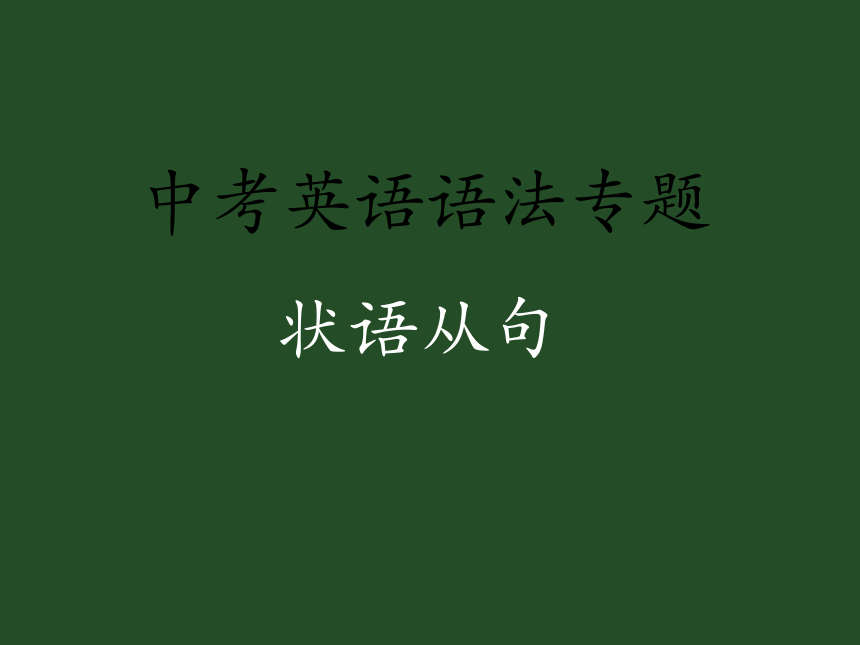 | |
| 格式 | pptx | ||
| 文件大小 | 1.7MB | ||
| 资源类型 | 教案 | ||
| 版本资源 | 通用版 | ||
| 科目 | 英语 | ||
| 更新时间 | 2022-04-06 08:20:48 | ||
图片预览

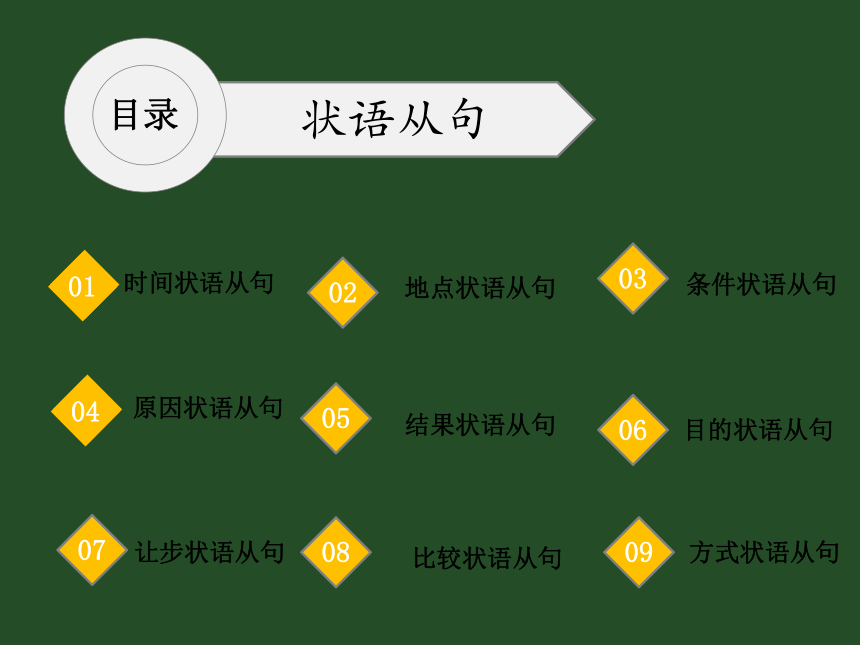
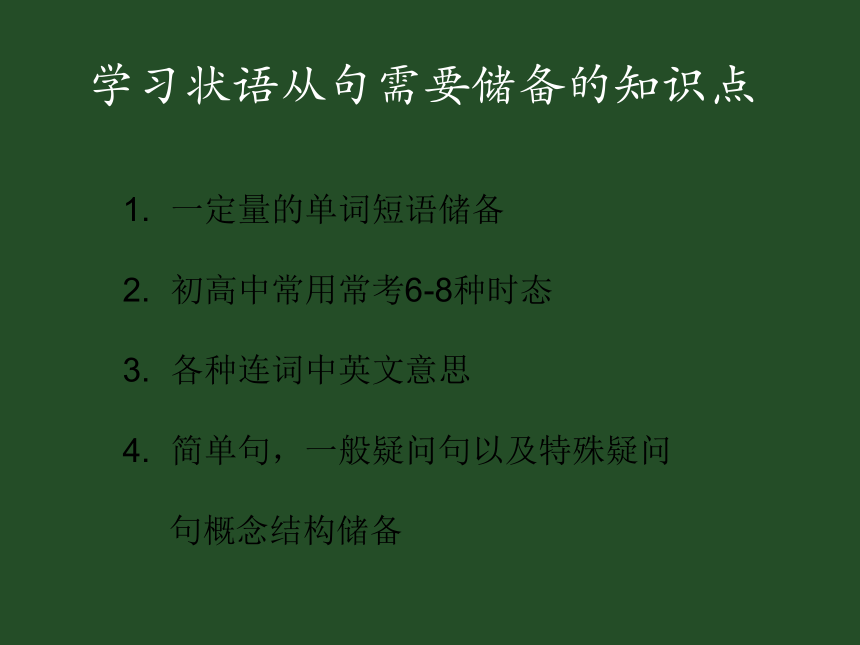
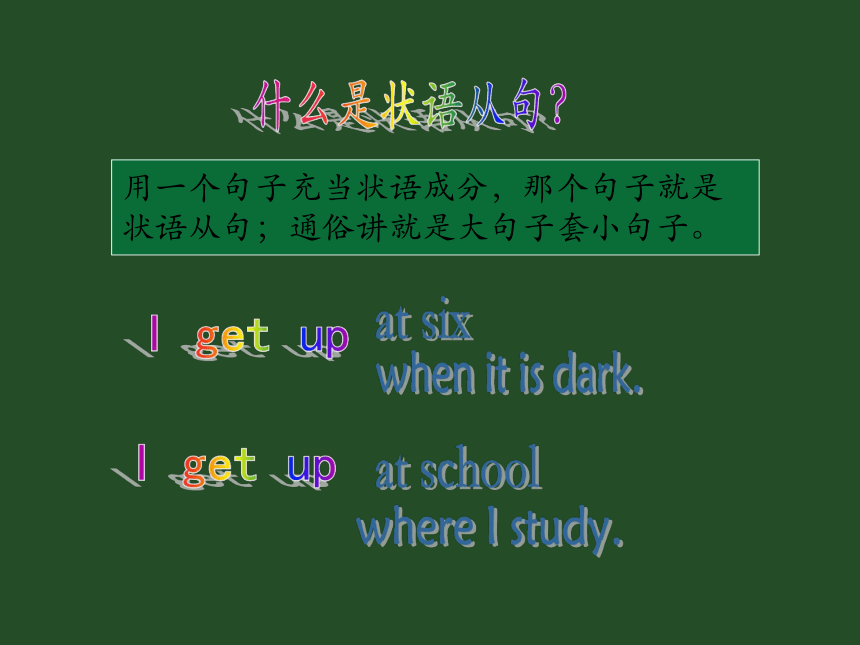
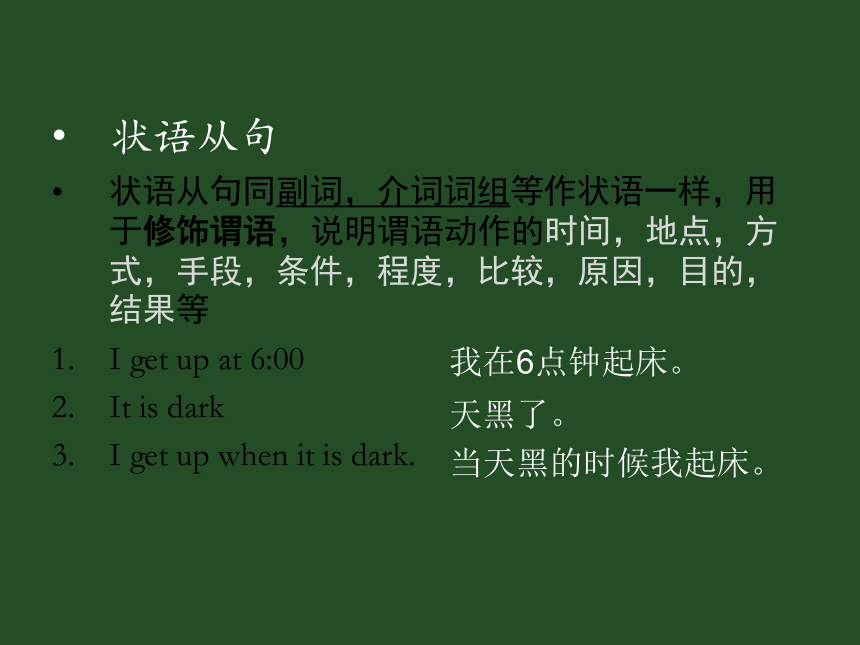
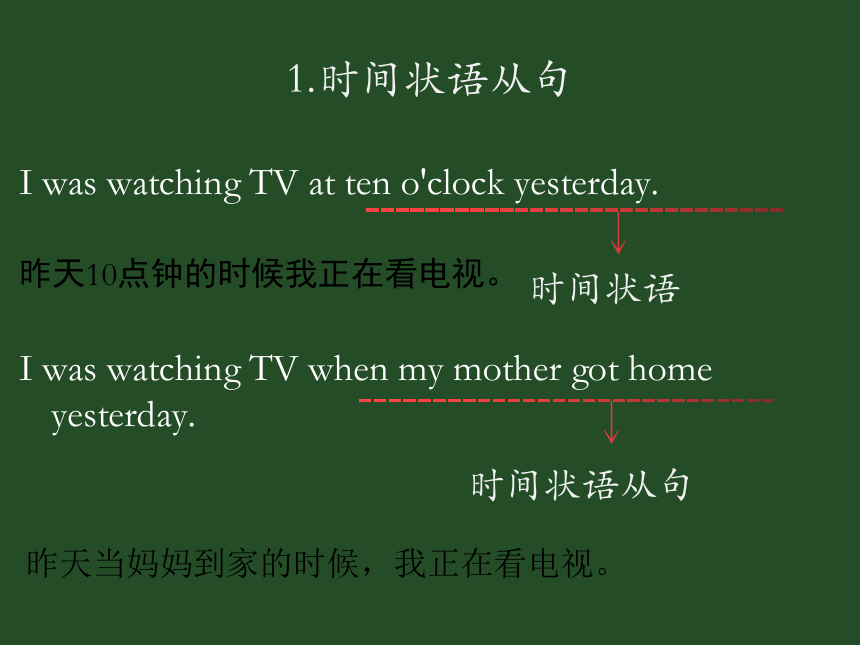
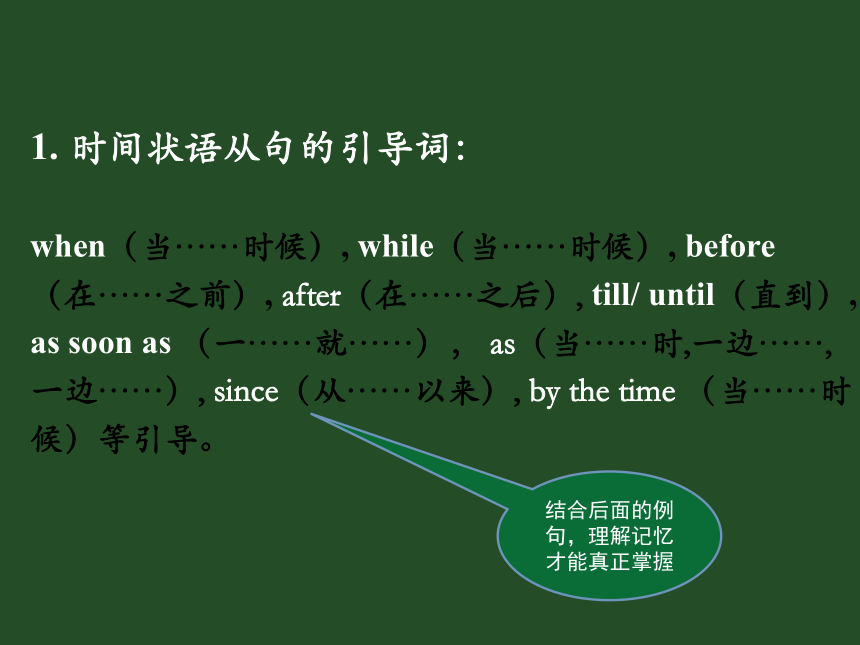
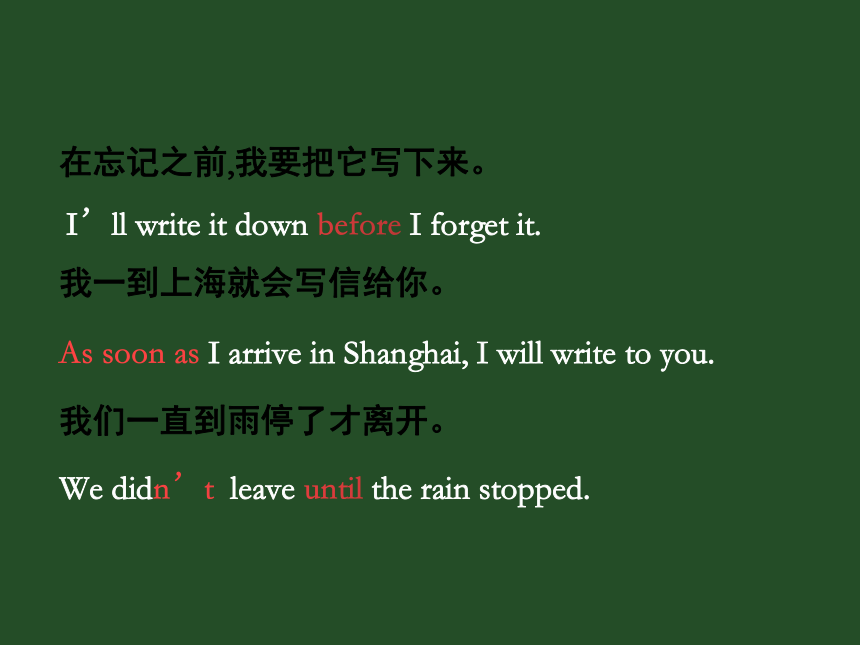
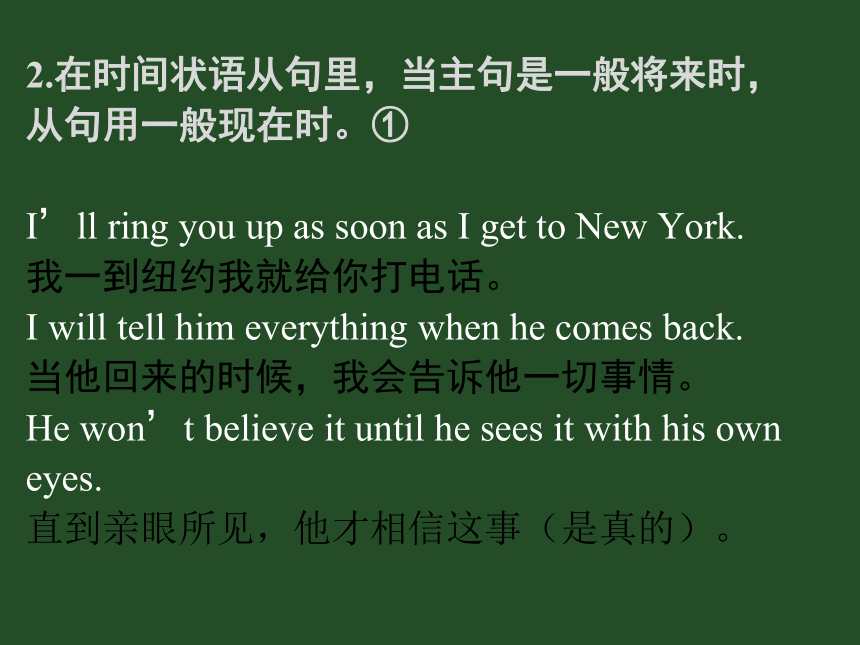
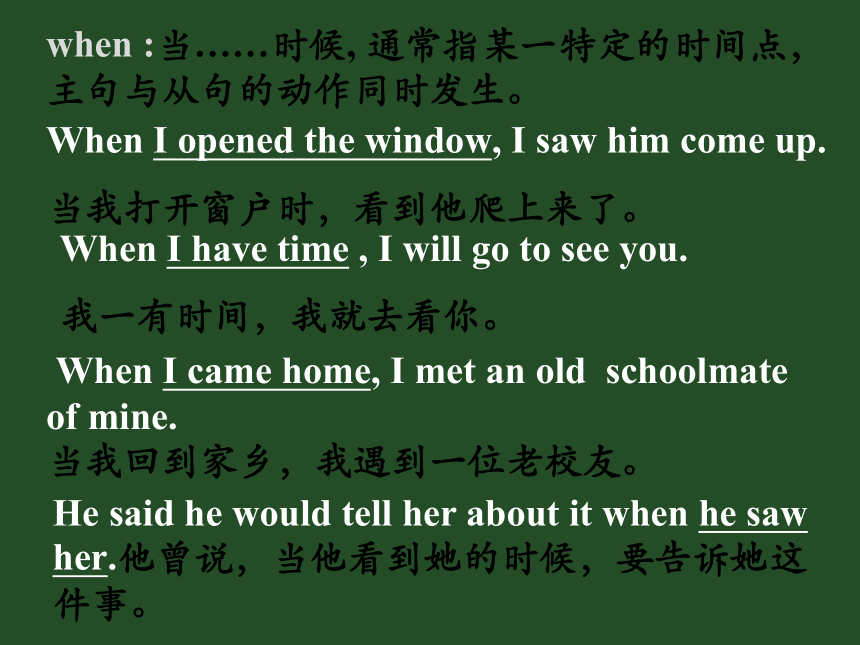
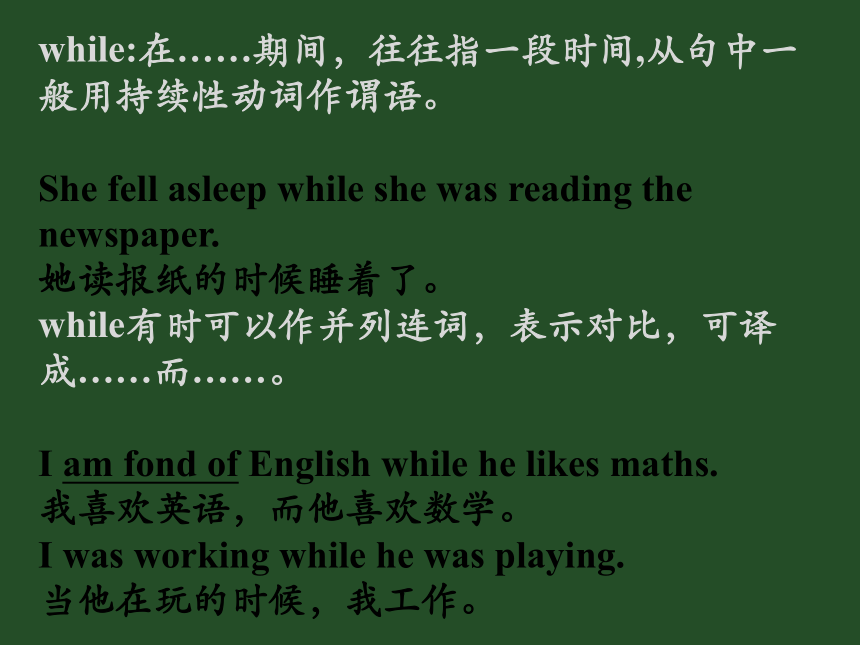
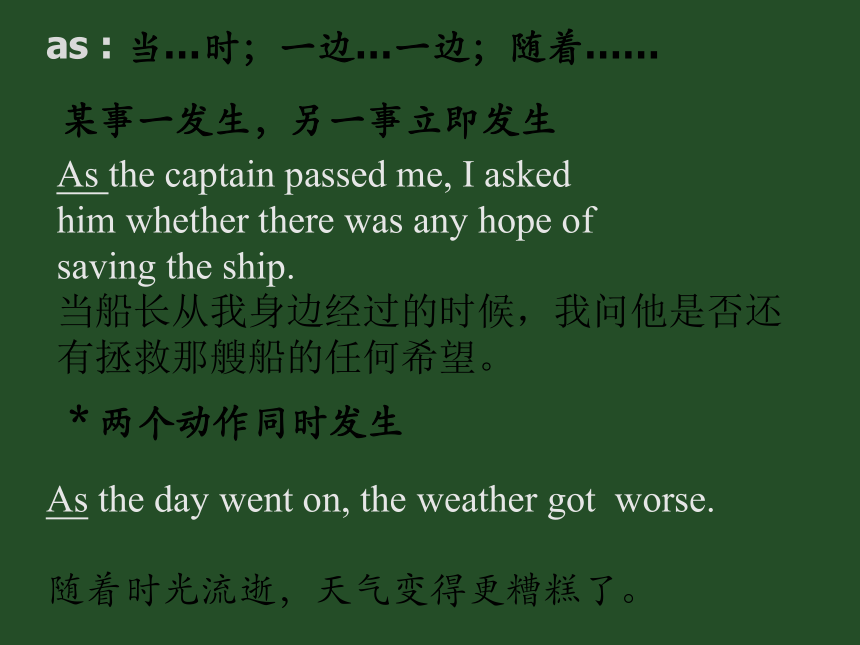
文档简介
(共41张PPT)
状语从句
中考英语语法专题
状语从句
01
时间状语从句
01
03
04
原因状语从句
04
目录
条件状语从句
07
让步状语从句
06
目的状语从句
09
结果状语从句
08
比较状语从句
02
地点状语从句
05
方式状语从句
学习状语从句需要储备的知识点
一定量的单词短语储备
初高中常用常考6-8种时态
各种连词中英文意思
简单句,一般疑问句以及特殊疑问
句概念结构储备
什么是状语从句?
用一个句子充当状语成分,那个句子就是
状语从句;通俗讲就是大句子套小句子。
I get up
at six
when it is dark.
I get up
at school
where I study.
状语从句
状语从句同副词,介词词组等作状语一样,用于修饰谓语,说明谓语动作的时间,地点,方式,手段,条件,程度,比较,原因,目的,结果等
I get up at 6:00
It is dark
I get up when it is dark.
我在6点钟起床。
天黑了。
当天黑的时候我起床。
1.时间状语从句
I was watching TV at ten o'clock yesterday.
昨天10点钟的时候我正在看电视。
I was watching TV when my mother got home yesterday.
----------------------------
↓
时间状语
----------------------------
↓
时间状语从句
昨天当妈妈到家的时候,我正在看电视。
1. 时间状语从句的引导词:
when(当……时候), while(当……时候), before(在……之前), after(在……之后), till/ until(直到), as soon as (一……就……), as(当……时,一边……,一边……), since(从……以来), by the time (当……时候)等引导。
结合后面的例句,理解记忆才能真正掌握
在忘记之前,我要把它写下来。
我一到上海就会写信给你。
我们一直到雨停了才离开。
We didn’t leave until the rain stopped.
As soon as I arrive in Shanghai, I will write to you.
I’ll write it down before I forget it.
2.在时间状语从句里,当主句是一般将来时,
从句用一般现在时。①
I’ll ring you up as soon as I get to New York.
我一到纽约我就给你打电话。
I will tell him everything when he comes back.
当他回来的时候,我会告诉他一切事情。
He won’t believe it until he sees it with his own
eyes.
直到亲眼所见,他才相信这事(是真的)。
when :当……时候, 通常指某一特定的时间点,主句与从句的动作同时发生。
When I opened the window, I saw him come up.
当我打开窗户时,看到他爬上来了。
When I have time , I will go to see you.
我一有时间,我就去看你。
When I came home, I met an old schoolmate of mine.
当我回到家乡,我遇到一位老校友。
He said he would tell her about it when he saw her.他曾说,当他看到她的时候,要告诉她这件事。
while:在……期间,往往指一段时间,从句中一般用持续性动词作谓语。
She fell asleep while she was reading the newspaper.
她读报纸的时候睡着了。
while有时可以作并列连词,表示对比,可译成……而……。
I am fond of English while he likes maths.
我喜欢英语,而他喜欢数学。
I was working while he was playing.
当他在玩的时候,我工作。
as : 当…时;一边…一边;随着……
某事一发生,另一事立即发生
*两个动作同时发生
As the day went on, the weather got worse.
随着时光流逝,天气变得更糟糕了。
As the captain passed me, I asked
him whether there was any hope of
saving the ship.
当船长从我身边经过的时候,我问他是否还有拯救那艘船的任何希望。
____________he had finished his homework,he took a short rest.
____________he walked along the lake, he sang happily.
____________ she was typing the letter,the telephone rang
when, as, while区别
①when
②while
③as
When
As
While
"时间点"
"延续性动词"
“一边..........一边”
"时间段"
"终止性动词"
as soon as --- 一……就……
Jack went to school as soon as he got well.
杰克身体一恢复,他就去上学了。
I’ll ring you up as soon as I get an answer from him.
我一得到他的消息,我就给你打电话。
since :自从…, 通常主句用现在完成时
I have never been there again since I graduated from the university.
自从我从那所大学毕业,我未从没去过那里。
It is +时间段+since从句(过去时) ②
It has been +时间段+since从句(过去时)
It is five years since we met last time.
自从我们上次见面,已经5年了。
It has been ten moths since we graduated.
自从我们毕业,已经有10个月了。
before
① 在……前
I always read books before I go to bed
我睡觉之前总是读书。
It will be half a year before I come back.
半年之后我就回来了。
It won’t be half a year before we meet again.
我们不到半年就会再次见面。
It won't be long before I return to Beijing
我很快就要回北京了
②it will be +一段时间+ before...多久之后就...
③it won’t be +一段时间+ before...不久就....
※till, until和not…until:
1.until/till引导时间状语从句用于肯定句时,主句的动词是延续性动词,表示动作或状态一直持续到until/till所表示的时间,意为“某动作一直延续到某时间点才停止”。如:
We waited until he came.
2.用于否定句时,主句谓语动词是非延续性动词,从句为肯定,意为“某动作直到某时间才开始”,如:
He won’t go to bed till/until she returns.
练习 :
1. I’ll write to you _______ I get there.
A. while B. before C. as soon as D. by
2. He has lived in the city _________ he came back from America.
A. when B. before C. since D. after
3. We won’t leave here _______ our teacher comes back.
A. until B. since C. after D. as soon as
4. I had to finish the picture ________ my mother came back.
A. until B. before C. after D. while
5. John fell asleep ________ he was listening to the music.
A. after B. before C. while D. as soon as
中考题型
时间状语从句
2. 地点状语从句
地点状语从句由 where, wherever 等引导。
例如:
You can take a walk wherever you like to.
---Mom, what did your doctor say
--- He advised me to live where the air is fresher.
无论你喜欢去哪里,你都可以散散步。
妈妈,医生说的是什么?
他建议我住在空气新鲜的地方。
3.条件状语从句
由if(如果), unless(if...not,除非), so/as long as (只要)等引导,谈论的是一个有可能发生的事实及其产生的相关的结果,主句用现在时,从句也用现在时;主句用过去时,从句也用过去的某种时态。
主将从现具体地讲,主句是一般将来时(包括祈使句和含有情态动词can, may, must等),从句也用一般现在时。
①
We won’t wait for him, if he doesn’t come before 12o’clock.
如果他12点之前还不回来,我们就不等他了。
We won’t wait for him, unless he comes before 12o’clock.
除非他12点之前回来,我们才等他。
So long as you keep on trying, you will surely succeed.
只要你继续尝试努力,你终将会成功的。
“祈使句 + and (or)+ 结果句” ③
= 条件状语从句
Hurry up, or you'll be late.
快点,要不你就要迟到了。
=If you don't hurry up,you'll be late.
如果你不赶紧点,你将会迟到的。
Study hard and you will pass the exam.
努力学习,你将会通过考试的。
=If you study hard, you will pass the exam.
如果你努力学习,你就能通过测试。
You’ll be late ______ you don’t get up early tomorrow morning.
A. if B. when C. before D. until
If he ______ on time, we will go without him
A. doesn’t come
B. don’t come
C. didn’t come
If you _______ him tomorrow, please ask him if he ______ to work on the farm with us.
A. see ; goes B. will see; goes C. will see; will go D. see; will go
中考题型
Ex3总结: 这里考的是两个if -从句中的不同时态
第一个if 从句是条件状语从句, 要用一般现在时表将来, 也就是see
第二个if 从句是宾语从句, 不可用一般现在时表将来,如表将来(注意状语"明天”)要用将来时也就是will go
条件状语从句
如果
是否
4.原因状语从句
原因状语从句通常由because, as, since, 等词引导。
because语气较强,用以回答why问句。④
-Why are you late again today
-Because I've got a bad cold.
as语气较弱,较口语化,所表示的原因较明显。
As I didn’t know the way, I asked a policeman.
由于我不知道路,我问了一个警察。
since语气较弱,常表对方已知的事实,相当于汉语的“既然”。
Since you can't answer the question, you might ask someone else for help.
既然你不能回答这个问题,你可以找其它人帮助下。
because和so不能同用在一个句子里 ⑤,
英语中“因为”和“所以”不能同时出现在一个句子中
如:
我们不能说:
Because it rained hard, so we stayed at home.
因为雨下得很大,所以我们待在家里了。
应该说:
或
It rained hard, so we stayed at home.
Because it rained hard, we stayed at home.
because of和because的区别⑥
① because of后加名词代词或动名词或短语,不加句子,
而because加句子,例:
Because of his illness, he didn’t go to work.
因为他的病,所以他不能上班了。
Because he was ill, he didn’t go to work.
因为他生病了,所以不能去上班了。
形象比喻:because of 长,后+单词或短语;because短,后加句子。
1. I didn’t buy the dictionary yesterday ______ my aunt would give me one.
A. until B. because C. if D before
2. ---- Why did you come to school late this morning
----- ______ I watched the football World Cup until 12 o’clock last night.
A. If B. Because C. Since D. Though
中考题型
总结: 重点掌握because 的用法 (注: because 和so 不能同时用在一个句子中)
原因状语从句
5.结果状语从句
结果状语从句常用so that, such that等关联词引导。e.g.
He is so young that he can’t go to work.
He got so little pay that his family had to live on welfare money.
It’s such a good chance that we mustn’t miss it.
他如此小以致于他不能上班。
他工资很少,他的家人不得不靠救济金生活。
机会这样好,我们决不能失掉。
so…that …和 such…that… ⑦
such…that “如此的…以致于”表结果。该结构常见于:
1.such+a(an)+形+名词+that
2.such+形+复数名词/不可数名词+that
so…that “如此的…以致于”表结果。该结构常见于:
1.so+形/副+that
2.so+形+a(an)+单数名词+that
3.so+many/much/few/little+复数名词(不可数名词)+that
It was such a wonderful film that all of us wanted to see it again.
=
The film was so wonderful that all of us wanted to see it again.
这部电影如此精彩,以至于我们都想再看一次。
It is such an important match that nobody wants to miss it.
这是如此重要的一场比赛,以至于没人想错过它。
=The match is so important that nobody wants to miss it.
这场比赛如此重要以至于没人想错过它。
He had such long arms that he could almost touch the ceiling.
他有如此长的胳膊以至于他几乎能够够得着天花板。
Soon there were so many deer that they ate up all the wild roses.
不久由于有如此多的鹿,它们吃尽了所有野生玫瑰。
He has so little time that he can’t go to the cinema with you.
他有如此少的时间,以至于他不能跟你去看电影。
注:名词前由many, much, little, few等词修饰时,用so,不用such
⑧
so……that句型的否定形式可用简单句
too……to或not……enough to代替。
如:
He is so young that he can't go to school.
他太小以至于不能上学。
=He is too young to go to school.
他太小了而不能上学。
=He is not old enough to go to school.
他不够上学的年龄。
6.目的状语从句
(1).引导目的状语从句的词组有so that, in order that等,谓语中常含有may, might, can, could, will, would等情态动词。如:
He must get up early so that he can catch the first bus.
(2).当从句主语与主句主语一致时,可用so as to,in order to。⑨ 如:
He worked day and night in order that he could succeed.
=He worked day and night in order to succeed.
为了能够赶上早班车,他必须早起。
为了成功,他夜以继日的工作。
7. 让步状语从句
让步状语从句,表示“虽然,尽管,即使”等概念,
常用的关联词有:though, although, even though/ if 等。
Though he was ill, he was still working.
他虽然有病,但仍然继续工作。
Although it is difficult, we shall do it.
此事虽难,但我们还是要做。
Even though you say so, I do not believe it.
即使你这样说,我也不信。
①though和although可以互换,只是although比较正式。
②though/ although不可以与连词but连用,但可以与yet,still连用。
例:不可以说类似下句
Though it was raining hard, but he still went out.
但可以说下面两句
Though it was raining hard, he still went out.√
It was raining hard, but he still went out . √
尽管天下着大雨,他还是出去了。
⑩
×
8. 比较状语从句
比较状语从句常用than或as…as,the more… the more
等引导。than表示两者的比较,as…as表示程度相同的
比较;The more…the more…表示” 越…越…”。例:
That book is more interesting than this one.
那本书比这本有趣。
He runs as fast as I (do).
他和我跑得一样快。
The more I see him , the less I like him.
我越看他就越不喜欢。
1. He doesn’t work so hard __ you do.
2.The more you worry, _______you’ll succeed.
3.She did worse in the test ______she expected.
as
the less
than
练一练
他不如你工作努力。
你担心越多,成功的几率就越少
她在测试中表现要比预期差。
9. 方式状语从句
方式状语从句由 as, as if , as though 等引导。
You can do it as what I just did.
I couldn’t moved my legs. It was as if they were stuck to the floor.
He sounds as though he’s got a sore throat.
例如:
你可以照我刚说的做。
我的脚动不了了,好像粘在地面上一样。
听上去好像他的嗓子疼。
Let's do more exercises
( )1. We’ll set out as soon as our monitor _____.
A. come B. comes
C. will come D. has come
( )2. I’ll go with you if it _______fine tomorrow.
A. has been B. is C. will be D. be
( )3. I’ll meet him at the station when he _____.
A. will return B. return C. returns D. returned
( )4. I won’t go to see the film tonight, because I ____ my ticket.
A. lost B. have lost C. will lost D. didn’t have
B
B
C
B
( )5. —Are you going to visit the farm tomorrow
—Yes. But if it _____, we’ll stay at school.
A. rain B. rained C. rains D. will rain
( )6. Please don’t stand up in class until you ______.
A. were told to B. are told to
C. were told D. are told
( )7. They won’t be back until the work _____.
A . do B. does C. is done D. will do
( )8. Xiao Ming will come and play with me if he _____busy.
A. is B. won’t be C. isn’t D. will be
B
C
C
C
( )9. I will let you know about it as soon as I _________the news.
A. will get B. get C. got D. get
( )10. Though he is ill, ________he is still working hard.
A. but B. yet C. too D. either
( )11. He was late _______ the heavy rain.
A. because B. because of C. though D. if
( )12. He is ______ excited that he can’t speak any thing.
A. too B. to C. so D. enough
( )13. The boy is ______ lovely that we all like him.
A. so B. such C. too D. very
B
C
A
D
B
( )14. This is _____ an interesting book that I want to read it again.
A. so B. such C. quite D. very
( )15. He got up early _______ he could catch up with the others.
A. in order to B. To C. so that D. that
( )16. Our school is ______yours.
A. as three times large as B. as large three times as
C. three times as large as D. as large three times as
( )17. I wonder if he _______. If he _______, I’ll ask him to drive me there.
A. comes, comes B. come, come
C. will come, comes D. come, will come
C
C
C
B
状语从句
中考英语语法专题
状语从句
01
时间状语从句
01
03
04
原因状语从句
04
目录
条件状语从句
07
让步状语从句
06
目的状语从句
09
结果状语从句
08
比较状语从句
02
地点状语从句
05
方式状语从句
学习状语从句需要储备的知识点
一定量的单词短语储备
初高中常用常考6-8种时态
各种连词中英文意思
简单句,一般疑问句以及特殊疑问
句概念结构储备
什么是状语从句?
用一个句子充当状语成分,那个句子就是
状语从句;通俗讲就是大句子套小句子。
I get up
at six
when it is dark.
I get up
at school
where I study.
状语从句
状语从句同副词,介词词组等作状语一样,用于修饰谓语,说明谓语动作的时间,地点,方式,手段,条件,程度,比较,原因,目的,结果等
I get up at 6:00
It is dark
I get up when it is dark.
我在6点钟起床。
天黑了。
当天黑的时候我起床。
1.时间状语从句
I was watching TV at ten o'clock yesterday.
昨天10点钟的时候我正在看电视。
I was watching TV when my mother got home yesterday.
----------------------------
↓
时间状语
----------------------------
↓
时间状语从句
昨天当妈妈到家的时候,我正在看电视。
1. 时间状语从句的引导词:
when(当……时候), while(当……时候), before(在……之前), after(在……之后), till/ until(直到), as soon as (一……就……), as(当……时,一边……,一边……), since(从……以来), by the time (当……时候)等引导。
结合后面的例句,理解记忆才能真正掌握
在忘记之前,我要把它写下来。
我一到上海就会写信给你。
我们一直到雨停了才离开。
We didn’t leave until the rain stopped.
As soon as I arrive in Shanghai, I will write to you.
I’ll write it down before I forget it.
2.在时间状语从句里,当主句是一般将来时,
从句用一般现在时。①
I’ll ring you up as soon as I get to New York.
我一到纽约我就给你打电话。
I will tell him everything when he comes back.
当他回来的时候,我会告诉他一切事情。
He won’t believe it until he sees it with his own
eyes.
直到亲眼所见,他才相信这事(是真的)。
when :当……时候, 通常指某一特定的时间点,主句与从句的动作同时发生。
When I opened the window, I saw him come up.
当我打开窗户时,看到他爬上来了。
When I have time , I will go to see you.
我一有时间,我就去看你。
When I came home, I met an old schoolmate of mine.
当我回到家乡,我遇到一位老校友。
He said he would tell her about it when he saw her.他曾说,当他看到她的时候,要告诉她这件事。
while:在……期间,往往指一段时间,从句中一般用持续性动词作谓语。
She fell asleep while she was reading the newspaper.
她读报纸的时候睡着了。
while有时可以作并列连词,表示对比,可译成……而……。
I am fond of English while he likes maths.
我喜欢英语,而他喜欢数学。
I was working while he was playing.
当他在玩的时候,我工作。
as : 当…时;一边…一边;随着……
某事一发生,另一事立即发生
*两个动作同时发生
As the day went on, the weather got worse.
随着时光流逝,天气变得更糟糕了。
As the captain passed me, I asked
him whether there was any hope of
saving the ship.
当船长从我身边经过的时候,我问他是否还有拯救那艘船的任何希望。
____________he had finished his homework,he took a short rest.
____________he walked along the lake, he sang happily.
____________ she was typing the letter,the telephone rang
when, as, while区别
①when
②while
③as
When
As
While
"时间点"
"延续性动词"
“一边..........一边”
"时间段"
"终止性动词"
as soon as --- 一……就……
Jack went to school as soon as he got well.
杰克身体一恢复,他就去上学了。
I’ll ring you up as soon as I get an answer from him.
我一得到他的消息,我就给你打电话。
since :自从…, 通常主句用现在完成时
I have never been there again since I graduated from the university.
自从我从那所大学毕业,我未从没去过那里。
It is +时间段+since从句(过去时) ②
It has been +时间段+since从句(过去时)
It is five years since we met last time.
自从我们上次见面,已经5年了。
It has been ten moths since we graduated.
自从我们毕业,已经有10个月了。
before
① 在……前
I always read books before I go to bed
我睡觉之前总是读书。
It will be half a year before I come back.
半年之后我就回来了。
It won’t be half a year before we meet again.
我们不到半年就会再次见面。
It won't be long before I return to Beijing
我很快就要回北京了
②it will be +一段时间+ before...多久之后就...
③it won’t be +一段时间+ before...不久就....
※till, until和not…until:
1.until/till引导时间状语从句用于肯定句时,主句的动词是延续性动词,表示动作或状态一直持续到until/till所表示的时间,意为“某动作一直延续到某时间点才停止”。如:
We waited until he came.
2.用于否定句时,主句谓语动词是非延续性动词,从句为肯定,意为“某动作直到某时间才开始”,如:
He won’t go to bed till/until she returns.
练习 :
1. I’ll write to you _______ I get there.
A. while B. before C. as soon as D. by
2. He has lived in the city _________ he came back from America.
A. when B. before C. since D. after
3. We won’t leave here _______ our teacher comes back.
A. until B. since C. after D. as soon as
4. I had to finish the picture ________ my mother came back.
A. until B. before C. after D. while
5. John fell asleep ________ he was listening to the music.
A. after B. before C. while D. as soon as
中考题型
时间状语从句
2. 地点状语从句
地点状语从句由 where, wherever 等引导。
例如:
You can take a walk wherever you like to.
---Mom, what did your doctor say
--- He advised me to live where the air is fresher.
无论你喜欢去哪里,你都可以散散步。
妈妈,医生说的是什么?
他建议我住在空气新鲜的地方。
3.条件状语从句
由if(如果), unless(if...not,除非), so/as long as (只要)等引导,谈论的是一个有可能发生的事实及其产生的相关的结果,主句用现在时,从句也用现在时;主句用过去时,从句也用过去的某种时态。
主将从现具体地讲,主句是一般将来时(包括祈使句和含有情态动词can, may, must等),从句也用一般现在时。
①
We won’t wait for him, if he doesn’t come before 12o’clock.
如果他12点之前还不回来,我们就不等他了。
We won’t wait for him, unless he comes before 12o’clock.
除非他12点之前回来,我们才等他。
So long as you keep on trying, you will surely succeed.
只要你继续尝试努力,你终将会成功的。
“祈使句 + and (or)+ 结果句” ③
= 条件状语从句
Hurry up, or you'll be late.
快点,要不你就要迟到了。
=If you don't hurry up,you'll be late.
如果你不赶紧点,你将会迟到的。
Study hard and you will pass the exam.
努力学习,你将会通过考试的。
=If you study hard, you will pass the exam.
如果你努力学习,你就能通过测试。
You’ll be late ______ you don’t get up early tomorrow morning.
A. if B. when C. before D. until
If he ______ on time, we will go without him
A. doesn’t come
B. don’t come
C. didn’t come
If you _______ him tomorrow, please ask him if he ______ to work on the farm with us.
A. see ; goes B. will see; goes C. will see; will go D. see; will go
中考题型
Ex3总结: 这里考的是两个if -从句中的不同时态
第一个if 从句是条件状语从句, 要用一般现在时表将来, 也就是see
第二个if 从句是宾语从句, 不可用一般现在时表将来,如表将来(注意状语"明天”)要用将来时也就是will go
条件状语从句
如果
是否
4.原因状语从句
原因状语从句通常由because, as, since, 等词引导。
because语气较强,用以回答why问句。④
-Why are you late again today
-Because I've got a bad cold.
as语气较弱,较口语化,所表示的原因较明显。
As I didn’t know the way, I asked a policeman.
由于我不知道路,我问了一个警察。
since语气较弱,常表对方已知的事实,相当于汉语的“既然”。
Since you can't answer the question, you might ask someone else for help.
既然你不能回答这个问题,你可以找其它人帮助下。
because和so不能同用在一个句子里 ⑤,
英语中“因为”和“所以”不能同时出现在一个句子中
如:
我们不能说:
Because it rained hard, so we stayed at home.
因为雨下得很大,所以我们待在家里了。
应该说:
或
It rained hard, so we stayed at home.
Because it rained hard, we stayed at home.
because of和because的区别⑥
① because of后加名词代词或动名词或短语,不加句子,
而because加句子,例:
Because of his illness, he didn’t go to work.
因为他的病,所以他不能上班了。
Because he was ill, he didn’t go to work.
因为他生病了,所以不能去上班了。
形象比喻:because of 长,后+单词或短语;because短,后加句子。
1. I didn’t buy the dictionary yesterday ______ my aunt would give me one.
A. until B. because C. if D before
2. ---- Why did you come to school late this morning
----- ______ I watched the football World Cup until 12 o’clock last night.
A. If B. Because C. Since D. Though
中考题型
总结: 重点掌握because 的用法 (注: because 和so 不能同时用在一个句子中)
原因状语从句
5.结果状语从句
结果状语从句常用so that, such that等关联词引导。e.g.
He is so young that he can’t go to work.
He got so little pay that his family had to live on welfare money.
It’s such a good chance that we mustn’t miss it.
他如此小以致于他不能上班。
他工资很少,他的家人不得不靠救济金生活。
机会这样好,我们决不能失掉。
so…that …和 such…that… ⑦
such…that “如此的…以致于”表结果。该结构常见于:
1.such+a(an)+形+名词+that
2.such+形+复数名词/不可数名词+that
so…that “如此的…以致于”表结果。该结构常见于:
1.so+形/副+that
2.so+形+a(an)+单数名词+that
3.so+many/much/few/little+复数名词(不可数名词)+that
It was such a wonderful film that all of us wanted to see it again.
=
The film was so wonderful that all of us wanted to see it again.
这部电影如此精彩,以至于我们都想再看一次。
It is such an important match that nobody wants to miss it.
这是如此重要的一场比赛,以至于没人想错过它。
=The match is so important that nobody wants to miss it.
这场比赛如此重要以至于没人想错过它。
He had such long arms that he could almost touch the ceiling.
他有如此长的胳膊以至于他几乎能够够得着天花板。
Soon there were so many deer that they ate up all the wild roses.
不久由于有如此多的鹿,它们吃尽了所有野生玫瑰。
He has so little time that he can’t go to the cinema with you.
他有如此少的时间,以至于他不能跟你去看电影。
注:名词前由many, much, little, few等词修饰时,用so,不用such
⑧
so……that句型的否定形式可用简单句
too……to或not……enough to代替。
如:
He is so young that he can't go to school.
他太小以至于不能上学。
=He is too young to go to school.
他太小了而不能上学。
=He is not old enough to go to school.
他不够上学的年龄。
6.目的状语从句
(1).引导目的状语从句的词组有so that, in order that等,谓语中常含有may, might, can, could, will, would等情态动词。如:
He must get up early so that he can catch the first bus.
(2).当从句主语与主句主语一致时,可用so as to,in order to。⑨ 如:
He worked day and night in order that he could succeed.
=He worked day and night in order to succeed.
为了能够赶上早班车,他必须早起。
为了成功,他夜以继日的工作。
7. 让步状语从句
让步状语从句,表示“虽然,尽管,即使”等概念,
常用的关联词有:though, although, even though/ if 等。
Though he was ill, he was still working.
他虽然有病,但仍然继续工作。
Although it is difficult, we shall do it.
此事虽难,但我们还是要做。
Even though you say so, I do not believe it.
即使你这样说,我也不信。
①though和although可以互换,只是although比较正式。
②though/ although不可以与连词but连用,但可以与yet,still连用。
例:不可以说类似下句
Though it was raining hard, but he still went out.
但可以说下面两句
Though it was raining hard, he still went out.√
It was raining hard, but he still went out . √
尽管天下着大雨,他还是出去了。
⑩
×
8. 比较状语从句
比较状语从句常用than或as…as,the more… the more
等引导。than表示两者的比较,as…as表示程度相同的
比较;The more…the more…表示” 越…越…”。例:
That book is more interesting than this one.
那本书比这本有趣。
He runs as fast as I (do).
他和我跑得一样快。
The more I see him , the less I like him.
我越看他就越不喜欢。
1. He doesn’t work so hard __ you do.
2.The more you worry, _______you’ll succeed.
3.She did worse in the test ______she expected.
as
the less
than
练一练
他不如你工作努力。
你担心越多,成功的几率就越少
她在测试中表现要比预期差。
9. 方式状语从句
方式状语从句由 as, as if , as though 等引导。
You can do it as what I just did.
I couldn’t moved my legs. It was as if they were stuck to the floor.
He sounds as though he’s got a sore throat.
例如:
你可以照我刚说的做。
我的脚动不了了,好像粘在地面上一样。
听上去好像他的嗓子疼。
Let's do more exercises
( )1. We’ll set out as soon as our monitor _____.
A. come B. comes
C. will come D. has come
( )2. I’ll go with you if it _______fine tomorrow.
A. has been B. is C. will be D. be
( )3. I’ll meet him at the station when he _____.
A. will return B. return C. returns D. returned
( )4. I won’t go to see the film tonight, because I ____ my ticket.
A. lost B. have lost C. will lost D. didn’t have
B
B
C
B
( )5. —Are you going to visit the farm tomorrow
—Yes. But if it _____, we’ll stay at school.
A. rain B. rained C. rains D. will rain
( )6. Please don’t stand up in class until you ______.
A. were told to B. are told to
C. were told D. are told
( )7. They won’t be back until the work _____.
A . do B. does C. is done D. will do
( )8. Xiao Ming will come and play with me if he _____busy.
A. is B. won’t be C. isn’t D. will be
B
C
C
C
( )9. I will let you know about it as soon as I _________the news.
A. will get B. get C. got D. get
( )10. Though he is ill, ________he is still working hard.
A. but B. yet C. too D. either
( )11. He was late _______ the heavy rain.
A. because B. because of C. though D. if
( )12. He is ______ excited that he can’t speak any thing.
A. too B. to C. so D. enough
( )13. The boy is ______ lovely that we all like him.
A. so B. such C. too D. very
B
C
A
D
B
( )14. This is _____ an interesting book that I want to read it again.
A. so B. such C. quite D. very
( )15. He got up early _______ he could catch up with the others.
A. in order to B. To C. so that D. that
( )16. Our school is ______yours.
A. as three times large as B. as large three times as
C. three times as large as D. as large three times as
( )17. I wonder if he _______. If he _______, I’ll ask him to drive me there.
A. comes, comes B. come, come
C. will come, comes D. come, will come
C
C
C
B
同课章节目录
- 词法
- 名词
- 动词和动词短语
- 动词语态
- 动词时态
- 助动词和情态动词
- 非谓语动词
- 冠词
- 代词
- 数词和量词
- 形容词副词及其比较等级
- 介词和介词短语
- 连词和感叹词
- 构词法
- 相似、相近词比较
- 句法
- 陈述句
- 一般疑问句和否定疑问句
- 特殊疑问句及选择疑问句
- 反意疑问句
- 存在句(There be句型)
- 宾语从句
- 定语从句
- 状语从句
- 主谓一致问题
- 简单句
- 并列句
- 复合句
- 主谓一致
- 主、表语从句
- 名词性从句
- 直接引语和间接引语
- 虚拟语气
- 感叹句
- 强调句
- 倒装句
- 祈使句
- 句子的成分
- 句子的分类
- 题型专区
- 单项选择部分
- 易错题
- 完形填空
- 阅读理解
- 词汇练习
- 听说训练
- 句型转换
- 补全对话
- 短文改错
- 翻译
- 书面表达
- 任务型阅读
- 语法填空
- 其他资料
